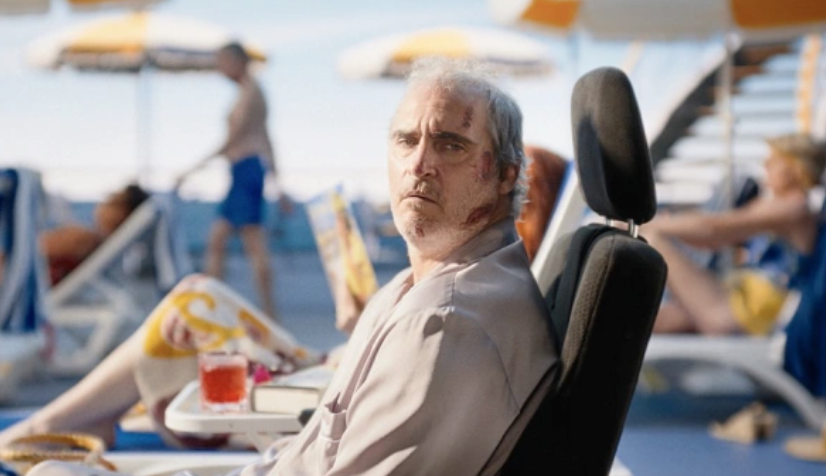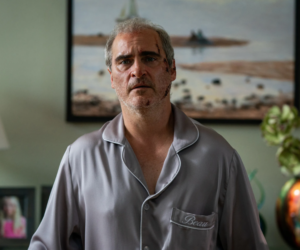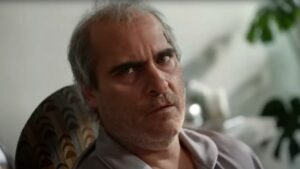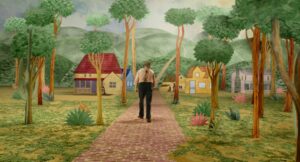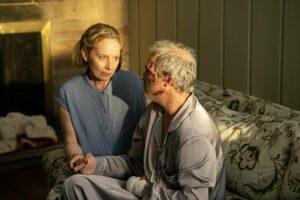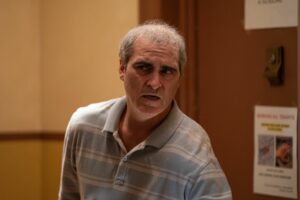Written and Directed by Ari Aster | 179 min | ▲▲▲△△ | VOD
This is the most polarizing film of the season — it arrived with a deluge of negative reaction on social media from the Asterphiles hoping for another Hereditary or Midsommar, followed by more muted, but largely positive, critical response. I come down somewhere in the middle. There’s a lot to admire in Aster’s epic exploration of Freudian attachment between a son and his mother, but at three hours it can’t help but wax and wane — the filmmaker’s wild self-indulgence often gets the better of him.
Joaquin Phoenix plays another of his deeply vanity-free and compromised characters. Beau Wasserman is a middle-aged, Jewish man absent any whiff of courage who lives in a crappy apartment in a rough part of town. What kind of living does he make, and how? It’s unclear. The opening 30 or so minutes of the film is a clinic in ratcheting anxiety — with every bad turn in Beau’s day, coming thick and fast, the misery and stress increases. This peaks with a manic Beau struck by a van in the street.
The second chapter finds Beau in a suburban home in the care of Grace (Amy Ryan) and Roger (Nathan Lane), who on the surface seem exceptionally caring, though also deeply reliant on prescription medication to help control the rages of a man (Denis Ménochet) who lives on their property — a former brother-in-arms of their deceased son. This while their teenaged daughter (Kylie Rogers) self-medicates and acts out, psychotically.
All Beau wants is go to see his mother, but Grace and Roger are in no hurry to see him go. At this point we’re starting to see Beau’s grip on reality is deeply compromised. Dreamlike — or nightmarish — is a fair descriptor of the entire film as we flash backward in time to Beau as a boy (James Cvetkovski) with his mother (Zoe Lister-Jones) on a cruise where Beau falls in love with a girl named Elaine (Julia Antonelli).
We get a scene where Beau is able to flash forward using a surveillance video, which shows us moments in the film still to come — Aster enjoys reminding us we’re watching a movie about a story. The meta overlay isn’t heavy handed, necessarily, but it is puzzling. Nightmare comedy might be a reasonable descriptor of the film, though it’s neither terribly frightening nor laugh-out-loud funny. Mostly, it discomfits.
It also drags a little. The thing is, despite energetic support from terrific screen presences such as Stephen McKinley Henderson, Parker Posey, Bill Hader, and veteran Canadian character actor, Julian Ritchings, Aster had built his an entire movie around Beau, a dude with next to no self-esteem. He’s got no agency in his own life, and the stench of his shame around his father’s fate, his own life choices, and his chronically disappointed mother (later on played by Patti LuPone) bubbles up under the film’s narrative like volcanic sulphur.
And don’t hold your breath that he’ll have any kind of inspiration or redemption over the course of the film — commonly known as an arc. This is a movie you endure. The audience serves as a witness to Beau’s grim fate.
We do get a lovely animated sequence around mid-movie, prompted by Beau’s encounter with a travelling theatre. I’d call it a fantasy sequence, where his journey takes a detour into a brief thread of heroism and sacrifice, but then all of this is fantasy. It’s a mistake to take any of it at face value.
The film’s relentlessness in plumbing its lead’s anxiety and chronic life failures makes one wonder about the mental health and family history of the filmmaker — themes around child abuse that cropped up in Hereditary surface again here. Though he hasn’t quite reached this pantheon, Aster’s film suggests he’s is looking to be in the company of other brilliant Jewish American filmmakers who enjoy plumbing personal trauma, names like Charlie Kaufman (Anomalisa), Darren Aronofsky (mother!), and Woody Allen (“Oedipus Wrecks” in New York Stories), who’ve tilled similar, difficult terrain.
By the time the last “chapter” of this episodic picture comes around, it doubles down on the guilt and recriminations in a way that I know some had trouble with. For me it was just part and parcel with everything else coming at us in this interesting, internal, somewhat perverse, regularly trying, but never boring movie.





